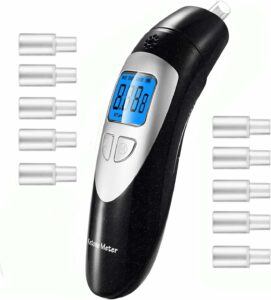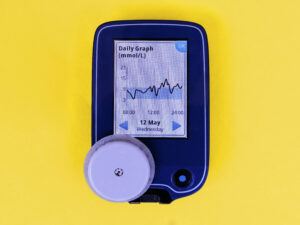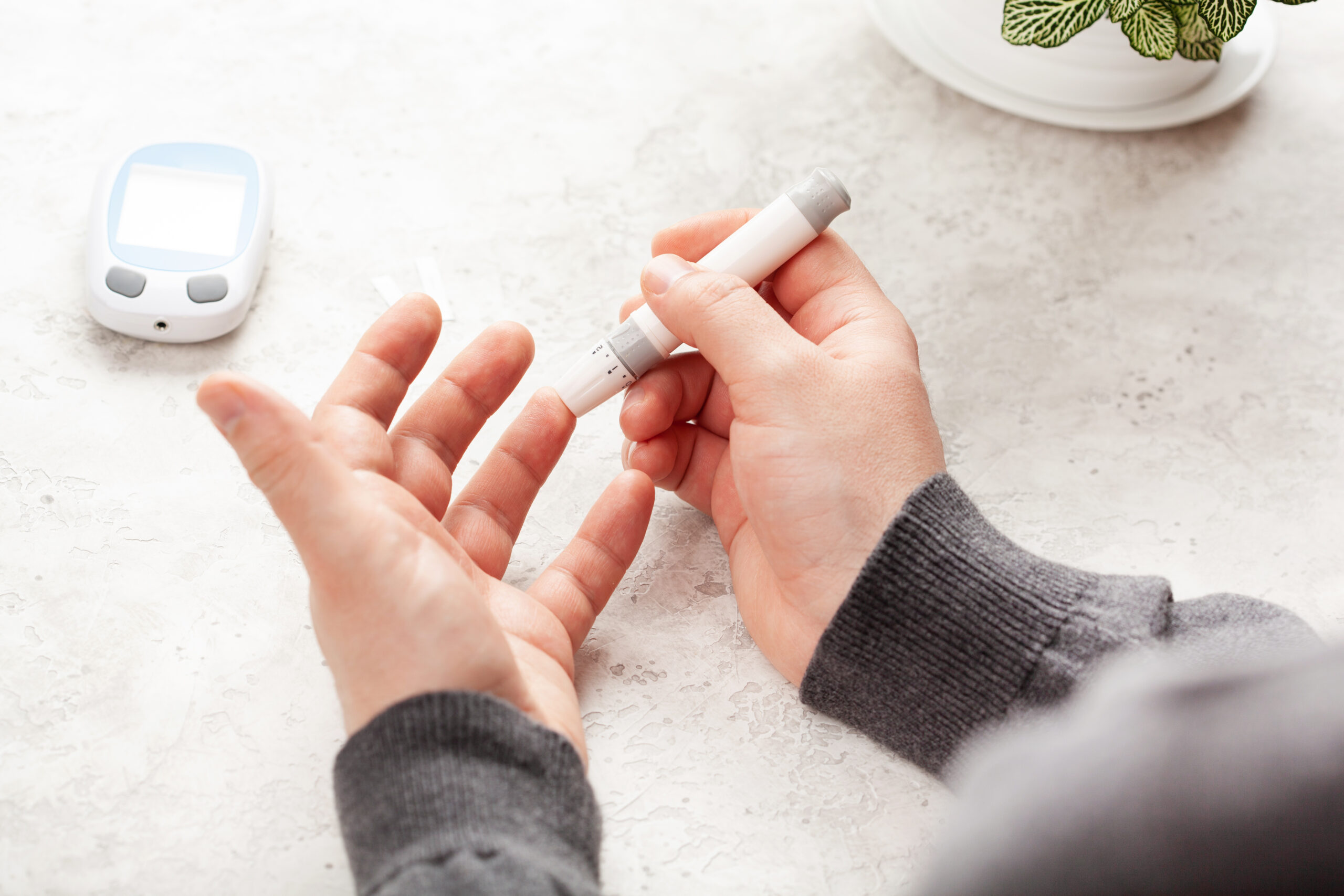Table of Contents
Best Glucose Meter for Ketogenic Diet: Track Your Blood Sugar Levels with Ease
If you follow a ketogenic diet, you know that monitoring your blood glucose levels is crucial to staying in ketosis and achieving your health goals. Choosing the right glucose meter can make all the difference in your journey towards optimal health. In this article, we will guide you through the process of selecting the best glucose meter for your ketogenic diet.
Understanding ketosis and blood glucose is essential to selecting the right glucose meter. When you follow a ketogenic diet, your body produces ketones, which it uses for energy instead of glucose. To stay in ketosis, you need to keep your blood glucose levels low. A glucose meter can help you track your blood glucose levels and ensure that you stay in ketosis.
Key Takeaways
- Choosing the right glucose meter is essential to staying in ketosis and achieving your health goals on a ketogenic diet.
- Understanding ketosis and blood glucose is crucial to selecting the right glucose meter.
- Top glucose meters for ketogenic diet enthusiasts offer additional features and considerations beyond basic glucose testing.
- Selecting the best ketone meter requires considering accuracy, ease of use, and integration with technology for optimal dietary feedback.
- A variety of ketone meters are available, each with unique features to meet individual health tracking needs.
- A ketone reading on its own gives you a snapshot of where you are at this exact moment, which means they can be independently influenced by immediate variables, such as stress (which heightens blood glucose) or a fat-rich meal (which heightens ketones).Source: hip2keto.com
- A ketone meter is a necessary tool for individuals following a ketogenic diet for various health purposes, such as weight loss, fat burning, diabetes management, general health, or therapy.
Understanding Ketosis and Blood Glucose
When following a ketogenic diet, it is important to understand how ketosis and blood glucose levels work together. Ketosis is a metabolic state where your body burns fat for fuel instead of carbohydrates. This process is achieved by limiting your carbohydrate intake and increasing your fat intake. By doing so, your liver produces ketones which are used as an alternative source of energy.
The Role of Glucose and Ketones in Ketosis
Glucose and ketones are both important fuel sources for your body. Glucose is typically the primary source of fuel for your body’s cells. However, when you limit your carbohydrate intake, your body begins to produce ketones which can be used as an alternative fuel source.
Ketones are produced by your liver from fatty acids. When you limit your carbohydrate intake, your body’s glycogen stores become depleted. This signals your liver to begin producing ketones which can be used by your body’s cells for energy.
Impact of Ketogenic Diet on Blood Glucose and Ketone Levels
When following a ketogenic diet, your blood glucose and ketone levels can be impacted. Since you are limiting your carbohydrate intake, your blood glucose levels may decrease. This can be beneficial for individuals with diabetes or those who are trying to lose weight.
However, it is important to monitor your blood glucose levels to ensure they do not drop too low. If your blood glucose levels drop too low, you may experience symptoms such as dizziness, confusion, and even loss of consciousness.
On the other hand, your ketone levels may increase when following a ketogenic diet. This is because your body is producing ketones as an alternative fuel source. However, it is important to monitor your ketone levels to ensure they do not become too high. High levels of ketones can lead to a condition called ketoacidosis which can be dangerous.
In conclusion, understanding how ketosis and blood glucose levels work together is important when following a ketogenic diet. By monitoring your blood glucose and ketone levels, you can ensure that your body is functioning properly and that you are getting the most out of your ketogenic diet.
Choosing the Right Glucose Meter for Keto Diet
When following a ketogenic diet, monitoring your blood glucose levels is crucial to ensure you are staying in ketosis and maintaining healthy blood sugar levels. Choosing the right glucose meter can make a big difference in the accuracy of your readings and the overall success of your keto journey. Here are some factors to consider when choosing a glucose meter for your ketogenic diet.
Factors to Consider: Accuracy and Calibration
One of the most important factors to consider when choosing a glucose meter is accuracy. You want a meter that provides consistent and reliable readings. Look for a meter that is calibrated specifically for ketone testing, as this will ensure the most accurate results. The Keto-Mojo and FORA 6 are both highly accurate glucose meters that are specifically designed for use on a ketogenic diet.
Price and Test Strip Affordability
Another important factor to consider when choosing a glucose meter is price and blood test strip affordability. While some meters may be more expensive upfront, they may end up being more affordable in the long run due to lower-priced blood test strips. Look for a meter that has affordable test strips that are readily available. The CareTouch and Keto-Mojo glucose meters both offer affordable test strips.
Ease of Use and User Experience
Finally, consider the ease of use and user experience when choosing a glucose meter. You want a meter that is easy to use and provides clear and concise readings. Look for a meter with a large, easy-to-read display and simple navigation. The Keto-Mojo and Precision Xtra glucose meters both offer user-friendly interfaces and easy-to-read displays.
By considering factors such as accuracy, price, and ease of use, you can choose the right glucose meter for your ketogenic diet. Remember to always consult with your healthcare provider before starting any new dietary or exercise regimen.
Top Glucose Meters for Ketogenic Diet Enthusiasts
If you are following a ketogenic diet, you know that monitoring your glucose and ketone levels is essential to achieving and maintaining ketosis. A glucose meter is a must-have tool for anyone on a keto diet, as it helps you keep track of your blood sugar levels and make adjustments to your diet and exercise routine.
Measuring both glucose and ketone biomarkers gives you a better picture of metabolic health than either alone and helps you identify foods that might negatively affect ketosis.
Here are some of the best glucose meters for ketogenic diet enthusiasts.
- FORA 6 Connect: Blood Ketone Measurement System
- Keto-Doc: Advanced Blood Ketone Test Kit
- Keto-Mojo GK+: Blood Glucose and Ketone Dual Monitoring System
- KetoBM: Ketone Blood Test Kit
- KetoCoach: Blood Ketone Measurement System
- Kiss My Keto: Blood Ketone Test Kit
- KetoTrak: Ketone Monitoring Device
- KetoSens: Blood Ketone Analysis Kit
- Nova Max Plus: Glucose & Ketone Measuring Unit
- Precision Xtra: Blood Glucose and Ketone Monitoring Tool
Precision Xtra: A Dual Monitoring System
The Precision Xtra is a dual monitoring system that allows you to measure both your glucose and ketone levels with the same device. This makes it a convenient and cost-effective choice for those on a keto diet. The device uses a simple lancet to draw a small blood sample, which is then analyzed by the meter. The results are displayed on a clear and easy-to-read screen.
The Precision Xtra is highly accurate and has received rave reviews from users. It is also relatively affordable, making it a great choice for those on a budget.
Keto-Mojo GK+: Advanced Features and Connectivity
The Keto-Mojo GK+ is another great option for those on a ketogenic diet. This device is highly accurate and allows you to measure both your glucose and ketone levels with the same device. It is also packed with advanced features, such as Bluetooth connectivity and a mobile app that allows you to track your results over time.
The Keto-Mojo GK+ is a bit pricier than some other options, but it is well worth the investment for those who are serious about their keto diet.
In conclusion, choosing the right glucose meter is essential for anyone on a ketogenic diet. Whether you opt for a simple device like the Precision Xtra or a more advanced option like the Keto-Mojo GK+ or Freestyle Libre, make sure to choose a device that is accurate, reliable, and easy to use.
Additional Features and Considerations
When choosing a glucose meter for your ketogenic diet, there are a few additional features and considerations to keep in mind. These features can make a big difference in how easy and convenient it is to track your blood glucose levels.
Smartphone Integration and Apps
Many glucose meters now come with smartphone integration and apps. This can be a great feature if you want to easily track and monitor your glucose levels over time. With a smartphone app, you can easily log your readings, view trends, and even share your data with your healthcare provider.
Portability and Carrying Cases
If you’re always on the go, you’ll want a glucose meter that is portable and easy to carry with you. Look for a meter that comes with a carrying case or is small enough to fit in your pocket or purse. This way, you can easily test your glucose levels no matter where you are.
Insurance and Healthcare Provider Recommendations
When choosing a glucose meter, it’s important to check with your insurance provider and healthcare provider to see if they have any recommendations. Some insurance providers may only cover certain meters, so it’s important to check before you make a purchase. Your healthcare provider may also have recommendations based on your specific needs and medical history.
Overall, when choosing a glucose meter for your ketogenic diet, it’s important to consider your specific needs and lifestyle. With the right meter, you can easily track your glucose levels and stay on track with your diet and health goals.
Ketone Testing Beyond Blood Meters
If you’re on a ketogenic diet, you’re probably aware of the importance of measuring your ketone levels. Blood ketone meters are the most accurate way to do this, but they can be expensive and require pricking your finger. Luckily, there are other options for ketone testing that are more affordable and less invasive.
Breath Ketone Meters: Ketonix and Breathalyzer Options
Breath ketone meters measure the amount of acetone in your breath, which is a byproduct of ketone production. They are non-invasive and do not require any blood or urine samples. One popular option is the Ketonix Breath Ketone Meter, which uses a color-coded system to indicate your ketone levels. Another option is a breathalyzer, which can also measure acetone levels in your breath. However, it’s important to note that breath ketone meters may not be as accurate as blood ketone meters, especially in the early stages of ketosis.

Urine Test Strips: Simplicity and Affordability
Urine test strips are a simple and affordable way to measure your ketone levels. They work by measuring the amount of acetoacetate in your urine, which is another byproduct of ketone production. Simply dip the strip into your urine and compare the color to the chart on the bottle. While urine test strips are not as accurate as blood ketone meters, they are a good option for those on a budget or who prefer a non-invasive method of ketone testing.
In summary, while blood ketone meters are the most accurate way to measure your ketone levels, there are other options available that are more affordable and less invasive. Breath ketone meters and urine test strips are both good alternatives, but it’s important to keep in mind their limitations and potential for inaccuracies.

A comparison between Continuous Glucose Monitors (CGMs) and… Blood Glucose Monitoring (Finger Stick): What’s the Difference?
Continuous Glucose Monitoring (CGM) systems and traditional blood glucose monitoring through finger sticks are two common methods used to monitor blood sugar levels. While both methods serve the same purpose of tracking glucose levels, there are some key differences between CGMs and finger stick testing.
Continuous Glucose Monitors (CGM systems)
Continuous Glucose Monitors (CGM systems) consist of a small sensor inserted under the skin, usually on the abdomen or arm. This sensor continuously measures glucose levels in the interstitial fluid, providing real-time readings throughout the day and night. The information is transmitted wirelessly to a receiver or smartphone app, allowing users to track their glucose levels and identify trends.
Finger Stick Testing
On the other hand, finger stick testing involves pricking the finger with a lancet to draw a small sample of blood, which is then placed on a test strip and inserted into a glucose meter for analysis. This method provides a single, instantaneous reading of blood glucose levels.
One major advantage of Continuous Glucose Monitors systems is their ability to provide continuous monitoring without the need for frequent finger sticks. This can be especially beneficial for individuals following a ketogenic diet, as they often need to closely monitor their glucose levels. CGMs allow for easier tracking of glucose fluctuations throughout the day, providing valuable insights into how different foods and activities affect blood sugar levels.
However, Continuous Glucose Monitors do have some limitations. They can be more expensive than traditional finger stick testing, and they require regular sensor insertions and replacements. Additionally, CGMs may not be as accurate as finger stick testing when blood sugar levels are rapidly changing or during times of hypoglycemia or hyperglycemia.
Continuous Glucose Monitors (CGMs) do not provide blood ketone readings, therefore they only provide a partial understanding of your metabolic functioning. As a result, CGMs are not as useful as glucose-ketone meters for identifying trigger foods, and they do not allow for an examination of the relationship between glucose and ketone levels after meals. A CGM cannot accurately determine ketosis, making them less valuable for keto.
Source: keto-mojo.com
Finger stick testing, on the other hand, provides a more accurate and instantaneous reading of blood glucose levels. It is also generally more affordable than CGM systems. However, it does require more frequent testing, as glucose levels can fluctuate throughout the day.
Freestyle Libre: Revolutionary Continuous Monitoring
The Freestyle Libre is a revolutionary continuous glucose monitoring system that allows you to track your glucose levels in real-time. This device uses a small sensor that is inserted under the skin to measure your glucose levels continuously throughout the day. The results are displayed on a handheld reader or your smartphone, making it easy to keep track of your glucose levels on the go.
While the Freestyle Libre is a bit more expensive than so me other options, it is a game-changer for those who want to take their glucose monitoring to the next level.
me other options, it is a game-changer for those who want to take their glucose monitoring to the next level.
In conclusion, both CGM systems and finger stick testing have their advantages and limitations when it comes to monitoring blood sugar levels. For individuals following a ketogenic diet, the choice between CGM systems and finger stick testing will depend on their specific needs and preferences. CGM systems offer continuous monitoring and valuable insights into glucose fluctuations, but they can be more expensive and may have accuracy limitations. Finger stick testing provides accurate instantaneous readings at a more affordable cost but requires more frequent testing. Ultimately, it is important to choose a method that fits your lifestyle and allows for effective monitoring of glucose levels while following a ketogenic diet.
Managing and Tracking Your Ketone Levels
If you are following a ketogenic diet, tracking your ketone levels is crucial to ensure that you are staying in nutritional ketosis. Nutritional ketosis is the state where your body is burning fat for fuel instead of glucose. To achieve this state, you need to keep your carbohydrate intake low and your fat intake high.
How to Record and Interpret Results
The best way to track your ketone levels is by using a glucose meter that also measures ketones. There are several options available in the market, including blood ketone meters, breath ketone meters, and urine ketone strips. However, blood ketone meters are considered the most accurate and reliable.
To use a blood ketone meter, you need to prick your finger with a lancet and place a drop of blood on the test strip. The meter will then display your blood ketone level in millimoles per liter (mmol/L). A normal blood ketone level is between 0.5 and 3.0 mmol/L. If your blood ketone level is below 0.5 mmol/L, you are out of ketosis, and if it is above 3.0 mmol/L, you may be at risk of ketoacidosis.
Staying In Ketosis: Tips and Tricks
To stay in nutritional ketosis, you need to keep your carbohydrate intake low, ideally below 20 grams per day. You also need to make sure that you are consuming enough fat to provide your body with the energy it needs. Some tips to help you stay in ketosis include:
- Tracking your food intake using an app or a journal
- Eating plenty of healthy fats, such as avocados, nuts, and seeds
- Avoiding high-carb foods, such as grains, sugars, and starchy vegetables
- Testing your ketone levels regularly, especially in the morning when they are typically the highest
- A ketone meter is a useful tool for those following a ketogenic diet for weight loss, fat burning, diabetes, general health, or therapeutic purposes.
By following these tips and tracking your ketone levels regularly, you can ensure that you are staying in nutritional ketosis and reaping the many benefits of a ketogenic diet.
Lifestyle and Diet Considerations
When following a ketogenic diet, it’s important to consider how your lifestyle and diet choices can affect your blood glucose and ketone levels. Here are a few factors to keep in mind:
Adjusting Carbohydrate Intake and Weight Loss
One of the main goals of a ketogenic diet is to enter a state of ketosis, where your body burns fat for fuel instead of glucose. To achieve this, you need to limit your carbohydrate intake to 5-10% of your daily calories. However, the exact amount of carbs you need to consume to reach and maintain ketosis can vary based on factors such as your weight, activity level, and metabolic rate.
If you’re trying to lose weight on a ketogenic diet, it’s important to ensure that you’re in a calorie deficit. This means that you’re burning more calories than you’re consuming. To do this, you may need to adjust your macronutrient ratios and portion sizes to fit your goals.
Hydration, Alcohol, and Ketone Levels
Staying hydrated is essential for maintaining healthy blood glucose and ketone levels. When you’re dehydrated, your body may produce more glucose to compensate for the lack of fluids. This can lead to higher blood glucose levels and potentially kick you out of ketosis.
Alcohol can also affect your blood glucose and ketone levels. While some alcoholic beverages are low in carbs, others can be high in sugar and cause a spike in your blood glucose. Additionally, alcohol can interfere with your liver’s ability to produce ketones, which can slow down your weight loss progress.
Finally, high ketone levels can be a sign of dehydration or overconsumption of fat. While it’s important to maintain a moderate level of ketones for optimal fat burning, excessively high levels can be dangerous and lead to ketoacidosis.
By keeping these lifestyle and diet considerations in mind, you can optimize your blood glucose and ketone levels on a ketogenic diet.
Health Benefits and Risks
The ketogenic diet has gained a lot of popularity in recent years due to its potential health benefits. However, like any other diet, it has its own set of risks and benefits that you should be aware of before starting.
Ketogenic Diet and Type 2 Diabetes
If you have type 2 diabetes, the ketogenic diet may help you manage your blood sugar levels. According to a study published in the Journal of Medical Internet Research, the ketogenic diet can improve glycemic control and decrease the need for diabetes medication. However, it is important to work with your healthcare provider to make sure that the diet is safe for you and that your medication doses are adjusted accordingly.
Mental Clarity, Appetite Control, and Physical Performance
The ketogenic diet may also provide other benefits such as mental clarity, appetite control, and improved physical performance. When you are in a state of ketosis, your body uses ketones as an alternative fuel source instead of glucose. This can lead to increased mental clarity and focus.
In addition, the high-fat content of the ketogenic diet can help you feel full and satisfied, which may lead to a decrease in appetite and calorie intake. This can be especially beneficial for those who struggle with overeating or snacking throughout the day.
Finally, some athletes and fitness enthusiasts have reported improved physical performance on the ketogenic diet. However, more research is needed to determine the long-term effects on athletic performance.
Overall, the ketogenic diet has potential health benefits for those who are looking to manage their blood sugar levels, improve mental clarity, and control their appetite. However, it is important to work with your healthcare provider to make sure that the diet is safe for you and that you are getting all the necessary nutrients.
Support and Resources
When it comes to choosing the best glucose meter for your ketogenic diet, it’s important to consider the support and resources available to you. Here are a few things to keep in mind:
Online Communities and Support Groups
Joining an online community or support group can be a great way to connect with others who are also following a ketogenic diet and using a glucose meter. You can share tips and tricks, ask questions, and get feedback on your progress. Some popular online communities and support groups include Feedback and Kiss My Keto.
Warranties and Customer Service
When choosing a glucose meter, it’s important to consider the warranty and customer service options available. Look for a meter that comes with a lifetime warranty and user-friendly customer service. This will ensure that if you have any issues with your meter, you can get pain-free testing and support quickly and easily.
Overall, choosing the best glucose meter for your ketogenic diet is an important decision. By considering the support and resources available to you, you can ensure that you have the tools and information you need to succeed.
Frequently Asked Questions
What’s the top-rated ketone meter for keto dieters these days?
There are several top-rated ketone meters available in the market that can help you track your ketone levels. The Precision Xtra and the Keto-Mojo are two of the most popular and reliable ketone meters for keto dieters.
Which blood ketone meter gives the most bang for your buck?
If you are looking for a ketone meter that gives you the most bang for your buck, the Keto-Mojo is a great option. It is affordable, easy to use, and comes with a lifetime warranty.
Is there a combo meter for tracking both blood glucose readings and ketones?
Yes, there are several combo meters available that allow you to track both blood glucose readings and ketones. The Precision Xtra and the Keto-Mojo are two of the most popular combo meters for blood glucose readings and ketones.
What should my blood sugar levels be when I’m rocking the keto lifestyle?
When you’re following a ketogenic diet after blood testing, your blood sugar levels should be between 70-100 mg/dL. If your blood sugar levels are consistently higher than this range, it may be a sign that you need to adjust your diet or medication.
Which ketone meter is the FDA giving a thumbs up to?
The FDA has approved several ketone meters for use by people with diabetes. The Precision Xtra and the Keto-Mojo are two of the most popular ketone meters that have received FDA approval.
Can I grab a reliable ketone meter off Amazon, or what?
Yes, you can find reliable ketone meters on Amazon. However, it’s important to do your research and read reviews before making a purchase to ensure that you’re getting a quality product.
Is it important to consider the availability and affordability of glucose strips?
Make sure that the glucose meter you choose is compatible with readily available glucose strips. Check the manufacturer’s website or product description to ensure that you can easily find and purchase the necessary strips.
Do Insurance companies cover the costs of glucose-ketone meters?
Glucose monitoring systems are often covered by insurance, and glucose-ketone meters are always HSA or FSA-eligible.
Source: keto-mojo.com
Are Ketone test strips covered by insurance?
Ketone test strips are not covered by insurance, but the cost of the meter itself may be covered. It’s best to check with your insurance provider to see what is covered under your plan.
Is there a difference between Glucose test strips and Ketone test strips?
You must purchase ketone test strips to test ketone levels! as glucose test strips won’t test for ketones.
Source: verywellhealth.com
What is Continuous glucose monitoring?
Continuous glucose monitoring (CGM) is a method of tracking blood sugar levels continuously throughout the day. This involves wearing a small sensor under the skin that measures glucose levels in the interstitial fluid. The sensor then transmits this data to a receiver or smartphone app, allowing users to monitor their glucose levels in real-time.
CGM can be particularly beneficial for individuals following a ketogenic diet as it provides more detailed and frequent information about blood sugar levels. This can help users make more informed decisions about their diet and lifestyle choices to maintain ketosis and manage their blood sugar levels effectively.
While continuous glucose monitors are much more expensive, less accurate, and don’t measure ketone levels, they can sometimes be a partial solution for individuals who lack the ability or willingness to self-administer finger stick tests
Some popular CGM devices include the Dexcom G6, FreeStyle Libre, and Medtronic Guardian Connect. These devices often require a prescription from a healthcare professional and may not be covered by insurance for everyone.

